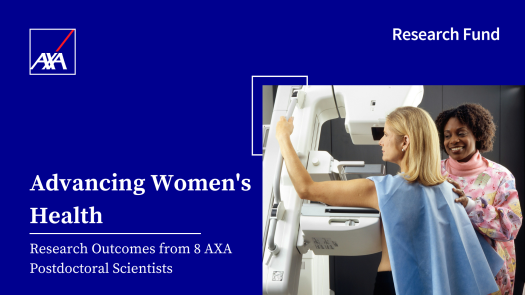Women's Health
Post-Doctoral Fellowships
Ireland
Reducing maternal mortality by diagnosing undetected bleeding disorders
Bleeding during childbirth or postpartum haemorrhage is one of the main causes of maternal mortality worldwide and is responsible for more than a third of all maternal deaths. Indeed, one woman dies every six minutes according to a 2014 World Health Organization analysis – a shocking figure. Many of these deaths could be avoided, however, by identifying in advance which women are at most risk of bleeding.
Irish haematologist Michelle Lavin, AXA Research Fund Women Health Fellowship Grantee, has been studying gynaecological bleeding and developing a technique that allows obstetricians to screen patients with an undiagnosed low von Willebrand factor (VWF), which is a protein that helps control bleeding. This bleeding is often only identified following a major bleed, like postpartum haemorrhage (PPH). By finding out which women have a low VWF before they give birth would allow delivery room medical staff to be aware of the bleeding risk and thus plan accordingly. This could help save their lives and reduce the occurrence of PPH around the world.
Current obstetric care does not include assessment for bleeding disorders and the new screening technique could be easily carried out during a routine antenatal visit. Ideally, it would be incorporated into standard practice.
Dr Lavin’s PPH-prevention study, carried out at the Irish Centre for Vascular Biology and Department of Molecular and Cellular Therapeutics, RCSI, involved enrolling 1000 pregnant women through participating maternity hospitals in Dublin over a period of 18 months.
The results from the PPH-prevention study will be used to determine “bleeding scores” that can help predict which women are at risk of PPH. This is an important step towards improving maternal outcomes. If these scores prove useful, this tool will be implemented for all pregnant women in the future – ideally, in the next two to three years.
Access to such health information will help increase awareness of women’s health issues in general and make this area a focus for further research and investment – something that has been lacking in the past. This applies not only to fundamental research, but also better funding of medical services related to women’s health, such as contraception, antenatal care and gynaecology. Many taboos surrounding women’s health still exist today and opening discussion will help reduce complications during childbirth and other periods in a woman’s life.
Thanks to her research, Dr Lavin is now recognized as being a leader in women’s health for women and girls with bleeding disorders and she is regularly invited to serve on prestigious and international medical and patient committees, spanning both haematology and gynaecology. Since 2019, she has co-authored 38 scientific publications (1).
In 2021, she was appointed Consultant Haematologist to develop a women’s health service in the National Coagulation Centre at St. James Hospital, Dublin. This is a huge recognition of both her experience to work in the leading coagulation service in Ireland but also of the need for more investment in women’s health – which has been far from a priority in the past. She is continuing her research programme with clinical work and plans further collaborative studies addressing the issues of bleeding risks for women.
February 2023
Women's Health Fellowhip: Outcome Summary
The following article summarizes all outcomes from 8 postdoctoral research projects from the Women's Helath Fellowship.
Read More

Michelle
LAVIN
Institution
Irish Centre for Vascular Biology
Country
Ireland
Nationality
Irish
Related articles
Women's Health
AXA Chair
Spain
Understanding Menopause's Effect on Women's Cardiovascular Risk
Cardiovascular disease (CVD) is the leading cause of mortality for women worldwide, yet women remain understudied. Atherosclerosis, the main pathology underlying... Read more
.thumbnail.jpg)
Inés
PINEDA-TORRA
University of Seville
Mental Health & Neurology
Women's Health
Pandemics & Infectious Diseases
AXA Award
Spain
The Effects of the COVID-19 Pandemic on the Mental Health of Mothers and Newborns
Early results are expected in less than 12 months and will help bridge a critical gap in research. Indeed, “in... Read more

Maria
FORASTER
ISGlobal Barcelona Institute for Global Health
Women's Health
Healthcare Systems & Access
Post-Doctoral Fellowship
United Kingdom
Towards timely and quality access to emergency obstetric care in Sub-Saharan Africa
Nearly 300 000 women (1) lose their lives each year from pregnancy-related complications, such as haemorrhage, high blood pressure, obstructed... Read more

Aduragbemi
BANKE-THOMAS